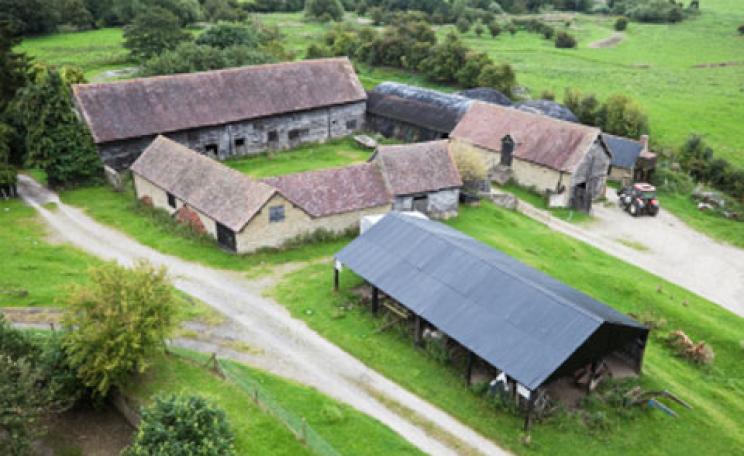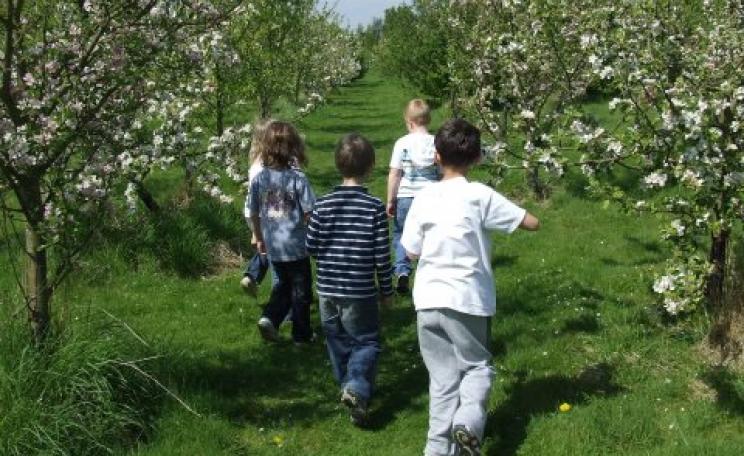Rising food prices, the drive for food security, biofuels and profits are fuelling a massive global landgrab. Some of this land is being bought by wealthy businessmen, some by predatory transnational corporations, which, with the collusion of corrupt, greedy governments, then enclose the land and clear it of small farmers and indigenous peoples.
The corporations sell the crops at high prices to the rich north. The result is that millions of people are being cleared from their customary land and forced into poverty.
In South America, for example, the area known as Patagonia stretches across southern Chile and Argentina. In the 1990s the Argentine government allowed large parts of Patagonia to be sold off. ‘If we don’t stop this intrusion,’ said Adolfo Pérez Esquivel, winner of the Nobel Peace Prize in 1980, ‘we will live in exile in our own land.’ The extranjerizacion or ‘internationalisation’ of land has resulted in frenzy of land purchased by the rich and famous. Luciano Benetton buying 900,000 hectares of Argentinian land for the mass-production of wool for his international clothing business. The company also has a tannery, pine plantations and other business initiatives there.
Media magnate Ted Turner owns a modest 55,000ha, which he says will be used for the protection of the environment and breeding and conservation of local endangered species.
Douglas Tompkins of North Face clothing owns 800,000ha in Argentina and Chile as a conservation land trust. Tompkins, the second-largest private property owner in Chile, has used the purchase to create the Pumalín National Park in that country, and the Monte León Park in southern Argentina.
Well-publicised good intentions aside, however, some of these estancias also enclose massive areas of freshwater, and because they are privately owned, local people no longer have access to this vital resource.
Pérez Esquivel says that the law favours the wealthy estancieros. In Benetton’s case, for instance, ‘the police are allowed to evict indigenous people by force and with absolute impunity’. In 2002, two indigenous Mapuche formally requested to reclaim 385ha of ancestral family land from Benetton. There was no response, so they occupied the land with their animals, only to be evicted 10 days later by the police on a provincial judge’s order. The judge based his desicion on an 1886 title deed of a British company benefiting from the ‘Conquest of the Desert’– a war against the indigenous peoples of Patagonia for their land.
Rosa Nahuelquir and Atilio Curiñanco still don’t have ‘their’ land back, in spite of a meeting in Rome with Benetton, which offered them land elsewhere. This particular ancestral land was a special place of origin for them as Mapuche. In 2007, Nahuelquir, Curiñanco and other members of their community reoccupied and set up camp on the land they believe rightfully belonged to their ancestors. The dispute is ongoing.
The complex, tragic story of ownership, clearance and dispossession is one all too well known in our own history. Scottish chiefs signed away their clansmen’s land in the Highland Clearances of the 18th century, and dispossessed Highlanders were shipped off to Canada to make way for Cheviot sheep. The House of (landed) Lords passed more than 10,000 Enclosure Acts to enclose common land and drive Welsh and English country people off the land. Opposition to enclosure was put down by the landed elite with thorough savagery and, when necessary, the deportation of ringleaders.
Domesticating their peasants at home prepared British colonialists to expropriate land in Patagonia and around the world. And as Anon says:
The law will hang the man or woman
Who steals the goose from off the common
But lets the greater thief go loose
Who steals the common from the goose.
Rich northern countries and companies alike are targeting the land of developing countries in the current global land-grab. Agribusiness is displacing small farmers: Korea’s Daewoo is buying a 99-year lease on a million hectares of land in Madagascar to grow 5m tonnes of corn, and plans to lease a further 120,000ha for palm oil, to be grown by South African workers. In 2007, the Philippines gave Chinese companies access to 1.24 million hectares. In 2008, the Saudi Middle Eastern Foodstuff Consortium announced plans for acquiring 500,000ha of basmati rice land in Indonesia. Middle Eastern states have been acquiring control of massive areas of farmland in various countries. There is a fi re sale of Laotian land going on, with China seeking a million hectares, though between two and three million hectares have already been leased to various states.
There is a similar, if less well documented, land-grab commencing in Central and Eastern Europe, particularly in parts of Ukraine, Russia and Lithuania, although undoubtedly elsewhere as well. In northern Ukraine, for example, where the farmland restituted to small farmers in the 1990s cannot legally be sold, northern European farming companies are buying long leases of large blocks of land. They are then turning this land over to a new form of industrialised farming, based on exporting hemp and flax fibres to China and grain to the northern hemisphere, often with biofuels made from the byproducts of the fibre production.
The farming companies offer jobs to some of the farmers from whom they have leased the land, and they also borrow back the lease payments that they have made to buy northern European machinery. In place of the stable small-scale farming communities of rural Ukraine, therefore, a new cash economy is emerging in which foreign farming companies are pivotal, and in which many of the dispossessed cannot participate.
This global agribusiness land-seizure destroys jobs, rural livelihoods and the environment. Millions of indigenous peoples and farmers are being dispossessed. The results are conflict, more urban slums, rising poverty, a corporate stranglehold on food, dislocation, social inequity and hunger, so it is vital to reflect on the causes of the land-grab.
First, the land-grab is being driven by the ideology of neo-economic liberalism of the free market, with its deep-seated dog-eats-dog ethic. As John Maynard Keynes once observed, capitalism rests on the belief that if everyone is nasty to everyone else then a healthy economy will be the result. This ideology is in fundamental conflict with the co-operative patterns of food-growing and complex customary land rights characterising traditional agriculture.
Second, neo-liberal economics treats such commons as air, water, natural resources and land as commodities to be enclosed and traded. Institutions such as the International Monetary Fund and the World Bank favour the commodification and marketisation of land, finding customary tenure systems hard to understand, let alone recognise and support. By definition, they must be inefficient. This is a totally different paradigm from traditional land systems, which are governed by custom, by overlapping rights, and by deep cultural and spiritual attachments of people to the land.
We can forget that landed property is a modern invention. Massasoit, a leader of the Wampanoag, asked the Plymouth colonists in the 1620s: ‘It cannot be the earth, for the land is our mother, nourishing all her children, beasts, birds, fish, and all men. The woods, the streams, everything on it belongs to everybody and is for the use of all. How can one man say it belongs only to him?’
Third, the legacy of colonialism, where ‘virgin land’ was conquered, mapped, distributed among immigrants, registered and enclosed is in basic conflict with traditional land systems. Australian Aborigines were not recognised as citizens of their own country until 1967, and were only recognised as its first inhabitants in 1993. Mapping, registering and securing multiple land interests is complex – as opposed to western, ex-colonialist land registry systems.
Some people own cashew trees, others can cultivate the land and others have hunting rights. This is a bit like English Common Law, which recognises a bundle of land rights rather than absolute land ownership and control. Governing elites that sign away land as if it were the state’s to lease or sell are bulldozing these traditional land tenure systems, and any agreements signed can be seen as ‘odious’.
There are three key questions that need addressing so as to counter the corporate land-grab. These questions go beyond debates such as private ownership of land versus forms of community land trusteeship on the one hand, or free market versus government regulation on the other.
The questions are:
1. How can the multiple and layered rights of land-users be secured?
2. How can land access be secured for both land-users and overall societal benefit?
3. How can land be managed while recognising cultural
diversity and tradition?
So what to do? Action needs to be taken on both the demand and supply side. On the supply side, global civil society, land researchers and international institutions such as the UN (through the Food and Agriculture Organization) must research and expose these disastrous land thefts by rapacious agribusiness and governments.
They must also expose how the land thefts are taking place and, thus, how they can be repelled. Active research needs to be undertaken into how nations can secure their land for local farmers and indigenous peoples, not profit-hungry corporations, though it may be that some companies can be sensitive partners. On the demand side, we need to ask how Britain and other rich importer countries can practically and sustainably provide more of its own food, so as to reduce global demand and the profits to be made from the land-grab, thus lessening the burden on the rural communities of the south.
What we need to underpin these initiatives is a new associative approach to the management of farm land; one in which multiple interests in, and uses of, land can be encouraged, such that food chains can be shortened and the land tilled according to the principles of long-term sustainable production. At its core, this is about breaking down the producer/consumer dichotomy and replacing it with mutuality, creating, in the words of agricultural pioneer Trauger Groh, a culture of community supporting agriculture and agriculture supporting community.
Stroud Common Wealth and Forum Synergies are planning a September 2009 conference into widening land access for community food-growing across Europe.
For more information, email Martin Large at [email protected]
This article first appeared in the Ecologist March 2009






